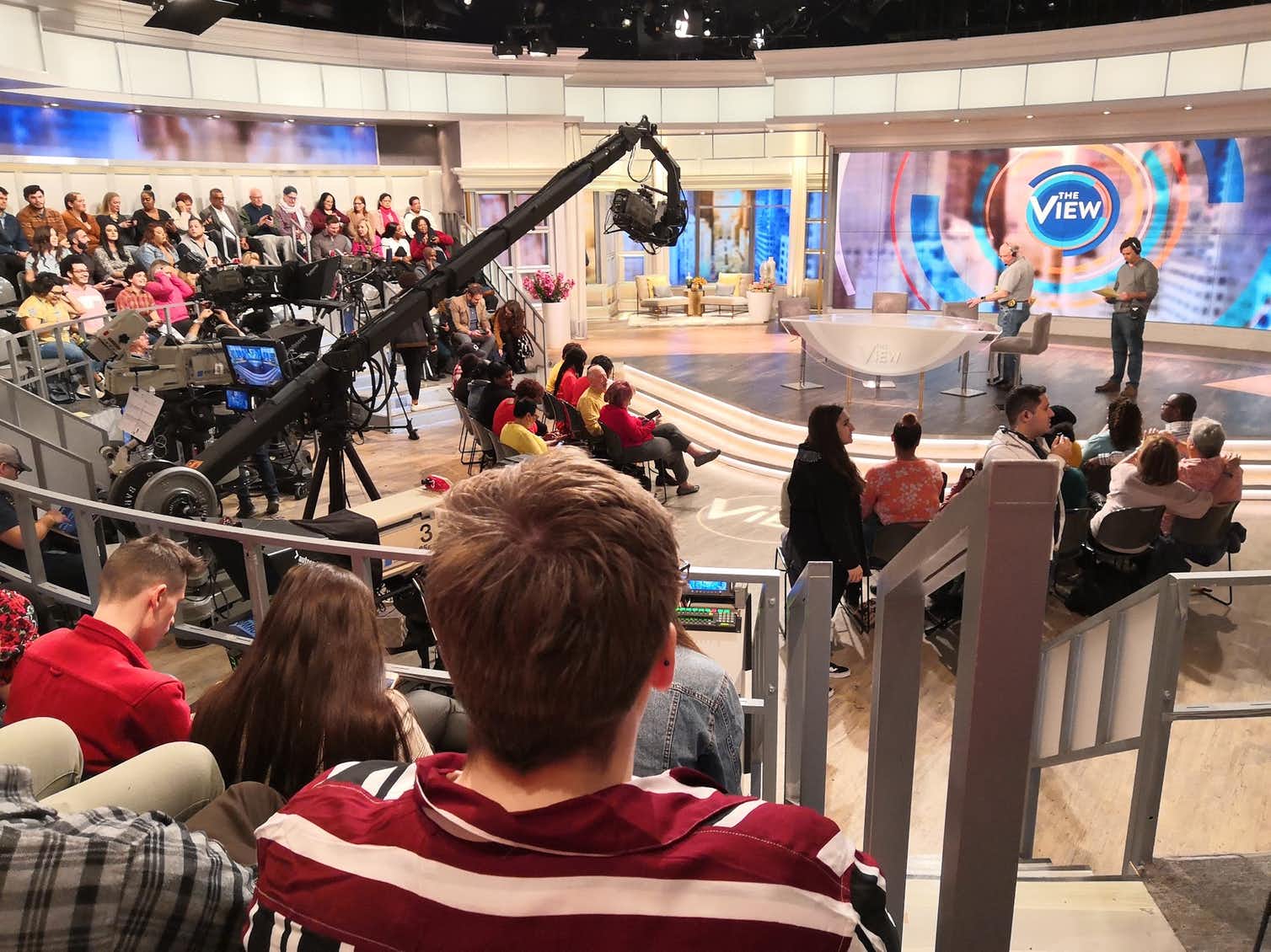Empty studios: Are you missing canned laughter yet?
Producers of comedy as long ago as the 1950s understood the value of the live audience – viewers at home would rather not laugh alone. Vanessa Jackson contemplates the loss of the crowd

I was in New York two weeks ago being encouraged to clap and whoop enthusiastically by a warm-up comedian, as a member of the studio audience for The View, Whoopi Goldberg’s live daily talk show – think Loose Women with American attitude.
Although we didn’t know it at the time, this was the last day The View would have a live audience for the foreseeable future. Now there are no studio audiences on either side of the Atlantic, due to the Covid-19 pandemic.
But what exactly is the purpose of a studio audience, and does it matter if they aren’t there? Loose Women has lost its live audience, so has Question Time. Even Ant and Dec’s Saturday Night Takeaway was transmitted without a studio audience on March 21, ironically recording its highest ever average audience of 9.5 million, peaking at 11.1 million, making it the best-watched show of the year so far.
The studio audience has a job to do. Producers of comedy as long ago as the 1950s understood the value of the live audience, with research suggesting that viewers at home would rather not laugh alone.
According to research, audience laughter actually boosts the credibility and likeability of hosts
We are social animals and frequently rely on others to reinforce how we should react to a particular situation, especially if that situation is ambiguous, such as in a satirical show. The studio audience through their laughter gives a cue to those in their living rooms that what they are watching is indeed funny, giving them “permission” to laugh themselves.
More than noise makers
In past decades, the function of the studio audience was simply to provide noise, essentially a laughter or clapping track, but nowadays producers want more, and live audiences are frequently seen, as well as heard.
Audiences are selected: they need to reflect the demographic the show wishes to appeal to and must look and act a certain way. The studio audience is the representative of the viewer at home, and viewers want to see people like them on camera watching and enjoying the show as it is produced.

For The View we were instructed to dress as if we were going to a Broadway show, wearing bright colours, no solid black or white, no shorts, no sleeveless tops, no T-shirts and definitely no logos. Failure to comply would lead to expulsion. We had to display energy and enthusiasm, while not reacting if we thought we were on camera.
Sitting there passively was not an option – we had a job to do. It was the role of the warm-up comedian, and the floor manager, to tell us when to clap and cheer, and to remind us at the start and end of each commercial break (of which there were many) to keep our energy levels up.
For many shows the audience has to do even more than looking and sounding good, they must be prepared to be an active part of the show. Coming down to the studio floor to participate in the actual show, for example in The Price is Right, voting in quiz shows like Who Wants To Be A Millionaire, or asking intelligent and thought provoking questions in Question Time. For these shows, the audience is key.
ITV cleverly managed to create the same feeling of inclusion by asking viewers of the audience-less Saturday Night Takeaway to video themselves in advance of Saturday’s show, performing to Olly Murs’ “Dance With Me Tonight”.
They then featured as many of these user-generated clips as possible on a video wall behind Olly Murs as he performed live. This wasn’t the same as a studio audience, but it imitated some of the functionality: showing ordinary people apparently enjoying the show and joining in while they watched at home.

Boosting energy
There is another crucial function that the studio audience plays, especially in comedies and sitcoms, that heightens the show’s performance. Actors and comedians need an audience to perform at their best, they feed off the energy of the audience. The audience is a key factor in the creative process and the cameras and crew alone are not enough.
The performers have to work for their laughs, with the audience helping pace their delivery. When the studio audience laughs, the actor must pause, judging when the laughter has died down sufficiently and they can carry on. This makes for a comfortable viewing experience at home. The viewer does not want to curtail their laughter for fear of missing the next joke, and the reinforcement of the studio audience’s laughter helps improve their enjoyment.
Taking this a step further, research has found that audience laughter actually boosts the credibility and likeability of hosts of political entertainment shows. Humour, and the laughter resulting from it, puts viewers into a positive frame of mind, enhancing their perception of the host, even if the subject matter is dull. When laughter accompanies an aggressive line of satirical questioning it signals to the viewer that there is comic intent. This allows presenters more freedom to ask pointed questions of guests without alienating viewers who might find the questioning too confrontational without it.
The work of the TV studio audience is important in a number of respects: it increases the performative energy of actors and comedians, provides laughter cues for viewers at home, actively participates in shows, and even boosts the credibility of hosts and shows themselves. In the forthcoming weeks and months, we are going to miss their input, but hopefully they will be back in their seats before too long.
Vanessa Jackson is an associate professor at Birmingham City University. This article was first published on The Conversation
Join our commenting forum
Join thought-provoking conversations, follow other Independent readers and see their replies
Comments
Bookmark popover
Removed from bookmarks